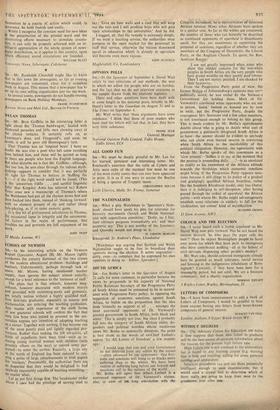SOUTH AFRICA
Si,—Jan Botha's letter in the Spectator of August 21 calls for some comment, in particular because the views he propounds in his capacity of National Public Relations Secretary of the Progressive Party of South Africa must be presumed to be in accord- ance with Progressive Party policy. In opposing the suggestion of economic sanctions against South Africa, he builds on the proposition that the idea finds 'virtually no support at all . . amongst the most convinced opponents of Dr. Verwoerd's present government in South Africa, both black and white.' This is simply not true, but since I probably fall into the category of South African exiles, do- gooders and political weirdies whose vociferous views Mr. Botha so summarily dismisses, the point is best made in the words of ex-Chief Luthuli's • appeal `To All Lovers of Freedom' is few months ago : I would urge that you and your Government be not deterred from any action by the excuse —often advanced by our oppressors--that boy- cotts and sanctions will bring to us blacks more suffering than to the whites. We have been victims of suffering long before our boycott and sanctions call to the nations of the world. . .
Mr. Botha will agree that Albert Luthuli is a convinced opponent of Dr. Verwoerd's regime; also, in view of hie long association with the Congress moveinent, he is representative of informed African opinion. Many other Africans have spoken in a similar vein. As far as the whites are concerned, the number of those who can honestly be described as convinced opponents of apartheid is disastrously small, but they are unanimous in supporting the proposal of sanctions, regardless of whether they are members of the Congress of Democrats, the Liberal Party, or the Anglican Church. To quote the Rev. Ambrose Reems
I am not greatly impressed when some who show this sudden concern for the non-white peoples in South Africa are the very people who have grown wealthy on their poorly paid labour. Then I am not merely puzzled. I am shocked by their hypocrisy.
From the Progressive Party point of view, the former Bist2p of Johannesburg's opinions may see'', politically weird; he was exiled by the VerwoerJ Government for holding them. Most of Dr. Verwoerd's convinced white opponents who are not in prison, 'listed,' hunted or banned are by now in exile, but the Progressive Party, despite the courageous Mrs. Suzmann and a few other members, is not convinced enough to belong to this group. This is made evident by Mr. Botha's apprehensive doubts about who is going to decide what sort of government a politically integrated South Africa is to have—the answer should be evident to anybody who can claim even limited success in converting white South Africa to the inevitability of this political integration. However, the equanimity with which Mr. Botha speaks of this conversion as a 'slow process'—'Suffice it to say at the moment that the process is proceeding daily... .'—is as unrelated to reality as his assessment of the African attitude towards the hardships which economic sanctions might bring. If the Progressive Party opposes sanc- tions because it still clings to its policy of a gradual and grudgingly qualified African franchise,. rather like the Southern Rhodesian model, only less liberal, then it is indulging in self-deception; after having passed through the ordeal of apartheid, the African public—with whom Mr. Botha might advantageously establish some relations—is unlikely to fall for the 'civilisation, not colour' kind of mystification.
33 Eton Avenue, N W3
SUZANNE CRONJE






























 Previous page
Previous page